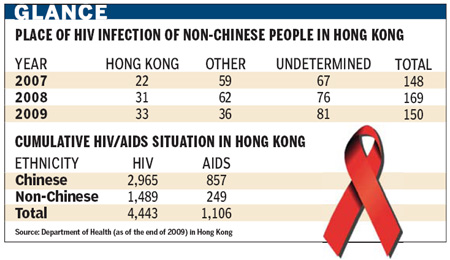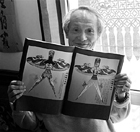Society
Infected, but not isolated, in Hong Kong
By Guo Jiaxue (China Daily)
Updated: 2010-05-05 07:46
 |
Large Medium Small |
A total of 59 countries, territories and regions across the globe have some form of entry restriction for HIV-infected visitors, while some countries in Asia - Singapore and Malaysia included - will deport foreigners who test positive, according to a 2009 report by the United Nation's AIDS program, UNAIDS.
Last month, the Chinese mainland lifted its ban on HIV patients traveling to the country.
Living conditions
Vincent, an American who tested HIV positive five years ago, said he decided to move to Hong Kong in 2008 because "it is somewhere that I don't feel threatened by AIDS-related laws".
The 30-year-old gay man, who declined to give his full name, was infected while working for a United States-based company in South Korea. After finding out his partner had been cheating on him, Vincent went through a period of having unprotected sex with random strangers.
"I took an HIV test and the results came out positive, meaning I lost my eligibility to stay in the country (South Korea only lifted its ban on HIV-infected foreigners in January this year)," he told China Daily.
For the next four years, he lived under the government's radar and had to work illegally to survive. He had no visa and no medical support. Today, he has a steady job teaching English in a Hong Kong primary school, gets proper medical care to manage his condition and has joined a group of English speakers so he can talk with other people living with HIV.
"The doctors here are very supportive. People are also more open (than South Korea) about everything, including AIDS and gay issues. And my current partner has been my saving grace through it all," said Vincent.
The low cost of medical treatment is also attractive. "Hong Kong is the best deal," he added.

Hong Kong residents, either permanent or non-permanent (Vincent is a non-permanent resident with a working visa) enjoy medical benefits provided by the regional government. "It costs HK$60 ($8) for a consultation with a specialist and HK$10 per prescription," said Lee of the Hong Kong AIDS Foundation.
For those people without Hong Kong residency, medicine can cost about HK$10,000 a month and more than HK$2,000 for each specialist consultation.
Even in the US, medication to control HIV would cost Vincent about $2,000, "which is just a little less than my monthly salary, so it would effectively wipe me out", he said.
Although Hong Kong is more convenient for sufferers, life with HIV is still not easy, especially for those living alone in a strange land.
Vincent calls himself an "atypical American" and is fond of foreign cultures. He can speak French, German, Cantonese, and Korean. The only thing holding him back is stigma attached to his disease.
|
||||
Despite his condition, Vincent now pays more attention to his health than ever. He quit smoking, goes to the gym and is trying to give up alcohol. However, every slight twinge of his body or tiny rash still gives rise to anxiety that it may be related to HIV.
"I chose to live my life. I make my own efforts to keep healthy," he said. "Sometimes it is not your disease that kills you; your mind kills you. That's why I always seek out positive life experiences that will help me deal with the cards I have been dealt."
He has also made good friends in Hong Kong, although he admits it was not easy at first. "Most of my friends know about my disease but there are still some people I don't feel comfortable disclosing it to," he said.
To give something back to the society that is helping him, the American uses his spare time to do charity work. He helps blind students to learn English and takes part in fundraising activities for an NGO that supports people in need, including HIV-positive citizens in Asia and Africa.
Vincent also welcomed the news that China had lifted its travel ban for HIV sufferers.
"Now, I will be able to reach out to people who are affected by HIV on the mainland through the NGO," he said. "It would be even better if the government decided to allow foreigners to live there. I hope to maybe live in China one day."
In contrast, the 30-something Thai woman is having a difficult time adjusting to her situation.
Being HIV positive has changed her life completely. She got divorced, lost her restaurant job and has to take medicine and try to cope with serious side effects every day. One of her only friends is another Thai girl she met at an AIDS support service center. She is also HIV positive.
"Sometimes I wake up in the night in a fever, I feel everything is falling apart," she said. "All I want now is to be happy again."
Job concerns
Foreign domestic helpers, who test positive for HIV, are at a high risk of being dismissed by their employers as soon as their condition is disclosed.
"Although the Disability Discrimination Ordinance passed last year made discriminating against AIDS patients illegal, employers will find other excuses to fire them," said Fung at the St. John's Cathedral HIV Education Center.
Vincent said he chose not to tell the school where he works he is HIV positive because of that reason.
"I want people, both those who live with HIV and those who don't, to realize that it's no longer a death sentence but perfectly manageable," he said. People fear HIV and AIDS based on irrelevant stereotypes, "ones that could easily be resolved through increased awareness and an overall elimination of the stigma attached to the disease".
"Medical technology has made a lot of progress," said the AIDS self-help organization spokesman who did not want to be identified. "With appropriate treatment, people with HIV can lead happy and healthy lives.
"What they need is full support - psychological and physical," he said. "More effort should be made to understand and care about these people. They are far away from their homes and living in this city with us," he said.








